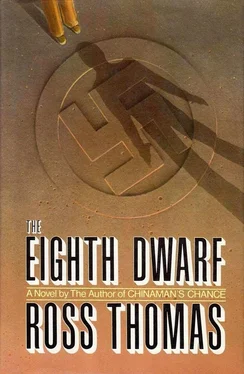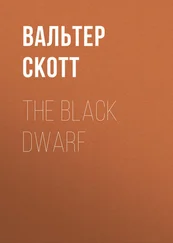“I have no idea,” Ploscaru said. “Ask him.”
“Well?” Jackson said, looking at Oppenheimer.
The man with his hands on his head smiled at Jackson pleasantly, almost curiously, but said nothing.
“I don’t think he’s in the mood,” Jackson said.
“Maybe he doesn’t understand English.”
“He understands it, all right. He can even talk Texan when he wants to — can’t you, Brother Oppenheimer?”
Again, Oppenheimer smiled pleasantly and kept on smiling.
“I think we’d better take him down to the cellar before he decides to do something foolish,” Ploscaru said.
Jackson nodded. “I think you’re right.” He took Oppenheimer by the arm and gestured with his pistol toward the door that led to the cellar. “We’ve got a nice, warm place all fixed up for you.”
Oppenheimer didn’t move until Jackson gave his arm a tug. After that he went along docilely, but in a curiously shambling walk, as though he were an old man wearing slippers that he was afraid would come off.
When they reached the stairs, Jackson stopped. “Go on down, Nick,” he said. “If our friend here tries something clever like a fake fall, you can shoot him on the way down.”
The dwarf hurried down the stairs and then waited, with pistol ready, for Jackson and Oppenheimer to descend the steps. There was no trouble. Oppenheimer went quietly but slowly down the stairs, smiling all the way.
Ploscaru hurried to open the door with the steel-mesh window and the heavy lock. Jackson steered the unprotesting Oppenheimer toward the small room. “It’s not much,” Jackson said, “but you won’t be here long.” He guided Oppenheimer into the room. As Jackson started to turn, Ploscaru jammed the Army .45 into his back.
“I won’t kill you, Minor, but I won’t hesitate to shoot you in the leg.”
“Well, shit, Nick.”
Ploscaru reached around and took Jackson’s pistol. “The trouble with you, Minor, is that you mistrust people, but not nearly enough. Now, if you’ll just go over and lean against the wall on your hands.”
Jackson propped himself against the wall with his hands. Ploscaru backed quickly out of the small room, closed the door, and locked it. Inside the room, Oppenheimer smiled pleasantly at Jackson.
“I’ll leave the light on,” Ploscaru said, calling up through the iron-mesh window. “Perhaps you can get him to talk.”
“Thanks.”
“It won’t be long.”
“You’re going to peddle him, Nick, aren’t you?”
“To the highest bidder,” Ploscaru said, and started up the stairs.
Bodden lay gasping on top of the wall. You’re too old for this, printer, he told himself. Much too old. He let his legs go over the side first, then lowered himself until he was hanging only by his hands. Watch the knee he thought. Land wrong and you’ll be a cripple. He landed wrong, and his right leg buckled under him. Bodden swore and clasped the knee with both hands, probing it tenderly. The pain was far sharper than before. Gingerly, he tried to rise, but couldn’t. The pain was too intense. You need a stick, he thought, something to support yourself with. He dragged himself along the wall, feeling in the grass for a stick or a pole. His hand found something. A hoe, by God! Just the thing.
Using the hoe as a kind of support, he started for the doorway. As he went slowly up the steps, he noticed for the first time that the door was open. Take your gun out, cripple, he told himself. A hoe’s a fine thing, but it’s not a potato you’ll find inside. He was reaching for the Walther pistol when Ploscaru came through the door.
Bodden tried to decide whether to hit the dwarf with the hoe or try for his pistol. The dwarf had no such decision to make. The knife came out of his sleeve in a blurred motion. He ducked low, very low, under the now-raised hoe. He struck once with the knife and then jumped back. The hoe came down, missing him by inches. Then the pain hit Bodden. He dropped the hoe and went down clumsily until he fell sprawling on the steps.
The dwarf approached him cautiously. “You’re not dead, are you?”
Bodden stared up at him. “No.”
“I knew I should have killed you in Frankfurt. But you’ll die quickly enough now.”
“You talk too much, little man. Far too much.”
Ploscaru nodded. “Probably,” he said. He stared down at Bodden, as though trying to decide something. Then he turned and ran lightly toward the iron gate. Bodden watched as the dwarf shinnied up the gate and down the other side. For a moment Ploscaru stared back through the gate at the man who lay sprawled on the steps of the large house. He nodded to himself, smiled a little and then turned and walked quickly down the street. As he walked, he dusted his hands together in either satisfaction or anticipation. It was hard to tell.
Jackson had been trying for fifteen minutes to get Oppenheimer to talk, but without success. They sat in diagonally opposite corners of the small room as Jackson conducted his one-sided conversation. To everything Jackson said, Oppenheimer smiled in a pleasant but rather loose-lipped way. His greenish-blue eyes were still bright and interested, but they moved constantly, as though everything demanded equal attention.
“I know your sister rather well,” Jackson said.
Oppenheimer smiled and inspected a shoe. His right one. He pulled at the shoelace, and when the loop moved a little he smiled even more.
Jackson stared at him with facination. At first he had thought that Oppenheimer was simply refusing to speak. This was followed by the suspicion that the silent, smiling man was faking it to throw Jackson off guard. But then came the almost-certain realization that Oppenheimer wasn’t faking at all.
“As I said, I know your sister rather well now. She thinks you’re crazy.”
Oppenheimer gave his shoelace another small tug and smiled delightedly at its movement.
“Or that’s what she said at first. She also said she wanted to get you to a sanitarium in Switzerland where they specialize in nuts like you. But it turns out that she was probably lying.”
The shoelace received another small, careful tug and another happy smile.
“What she really wants to do is get you to Palestine, where they’ll turn you loose on some carefully selected British types and maybe the odd Arab. If you killed enough of them, you might even become a national hero if the Jews ever get independence. You might even become a martyr. That’d be nice, wouldn’t it?”
Oppenheimer kept on smiling and playing with his shoelace.
“I fucked your sister, you know,” Jackson said.
Oppenheimer laughed, except that it was more of a chuckle than a laugh. It was a deep, throaty, pleased, wise chuckle that sounded full of cosmic secrets. His shoelace had come completely untied.
“You really are gone, aren’t you, friend?” Jackson said. “You’re out of it”
Oppenheimer took his shoe off and offered it to Jackson. When Jackson took it, Oppenheimer chuckled with delight and began taking off the rest of his clothes. He handed all the items to Jackson, who accepted each one with a small, commiserative shake of his head as he piled them neatly on the floor.
When all of his clothes were off, Oppenheimer discovered the small leather bag that hung around his neck. He took that off and opened it and ate one of the diamonds before Jackson could get them away from him. Jackson counted the diamonds. There were twenty-one of them, none less than a carat in size.
“If you’re real good,” Jackson said to the smiling naked Oppenheimer, “I might give you one later for dessert.”
When Ploscaru got back to the hotel, he went immediately up to his room, took four thick sheets of ivory-colored paper with matching envelopes from his suitcase, sat down at the desk, and began to write the invitations. He wrote with an old, broad-nibbed fountain pen and every once in a while would lean back to admire his penmanship. The dwarf had always prided himself on being able to write a beautiful hand.
Читать дальше












